N-Prolenta’s new work explores black identity and climate change
After a week-long, live-streamed isolation period, the multimedia artist will premiere Banana Island: Hublots at the New Museum.

Last Tuesday morning at 9.30 a.m., the stock markets opened up, and artist and producer N-Prolenta closed themselves off. For the past six days, the Fayetteville-based multimedia artist holed themselves up in a secret location to compose a mixtape, Hublots, as part of a live-streamed performance piece entitled Banana Island: Hublots. Their only interaction with the outside world was through the livestream: viewers could witness their composition process and donate money via PayPal to provide N-Prolenta with items such as food (bananas), water, or gifts.
I took a trip to Banana Island last week where I was greeted with a white, illuminated backdrop, a desk housing a few plants, a computer, recording equipment, and a blanket-clad N-Prolenta, pacing in and out of frame, enjoying a banana. They approached the mic to ooze low, escalating growls and repetitious exclamations like “My eyes are...BIGGER THAN MY STOMACH” or the gradually hypnotic “Here we go dowwwnnn…” Wherever down was, I suddenly felt like I was going there with them.
They performed these vocalizations while an extraterrestrial hum mysteriously seeped in and out of the background. They also incorporated unconventional sonic sources: they crumbled plastic wrappers or shook plants into the mic, after which they took another bite of banana, exaggerating the smacking noises as they chewed. When I checked in on the livestream again the next day, N-Prolenta had disappeared from view, leaving only a side-tab of a Fenty Beauty YouTube review playing on loop on their laptop.

"In Banana Island, I challenge notions of Blackness positing it as 'the unknown,' and therefore as 'territory to be excavated, surveilled, and dissected' beneath the penetration of light," explained N-Prolenta over email. "Incidentally, I spend lots of time out of the camera's frame or with muted or distant sound. I have interviews with other black artists in which their voices are muted or their faces obscured. This is a refusal."
"I also simulate what feels like the most imminent and presently encroaching future condition for the Black subject: precarity," they continued. "In a pressurized world where sea levels have risen, access to water and food are insecure, populations are far more dense, economic agents are increasingly single-actors, and power is garnered through the fidelity of the image, the Black subject maintains its position as fulcrum for those pressures, and experiences its brunt. With Banana Island, I produce a situation where my resources are scarce and the pressure to tap dance for the camera and to create channels for economic exchange, or suffer, is at a high. It's like if the Hunger Games were a crisis aid hotline."
Rhizome curator Aria Dean commissioned N-Prolenta's work as part of an online exhibit called First Look: New Black Portraitures. She explained the inspiration behind the exhibition in a phone interview last week. “The idea came out of some work I’d been doing prior," she said. "I was writing about blackness, and I’ve also just been in a lot of conversations with artists in which there’s the question of portraiture and how it’s always at play with blackness and how to represent black life.”
“Working with [N-Prolenta] has been fantastic,” Dean continued. “I think it’s groundbreaking, the way in which they are expressing how finance mediates our existence. They’re so rigorous in the way they work. I love someone who is so dedicated to their vision, and they have a wonderful way of infusing intentionality and flexibility.”
On Wednesday 25 October, N-Prolenta will release themselves from isolation to perform their composition process during a live performance at the New Museum theater. 60% of proceeds from N-Prolenta’s livestream will be directed towards hurricane relief for those affected in St. Maarten, South Florida, Puerto Rico, and Haiti, as well as victims of the 2017 Sierra Leone Mudslide.




